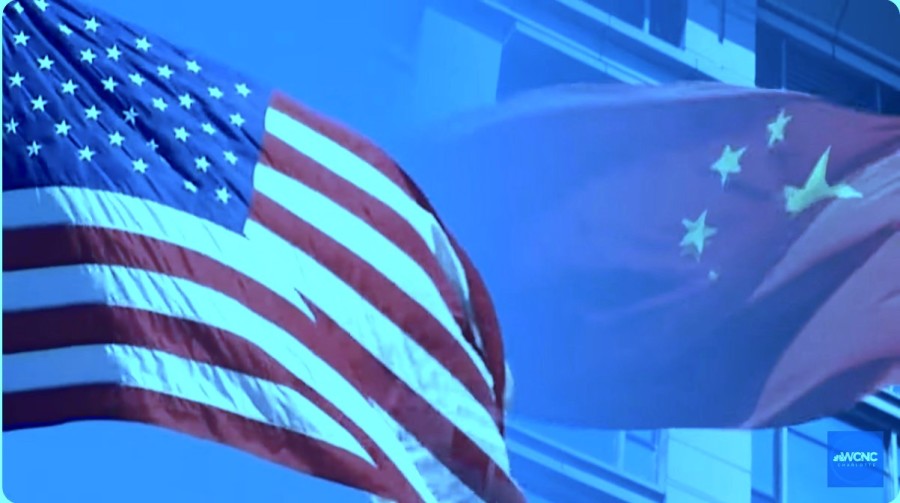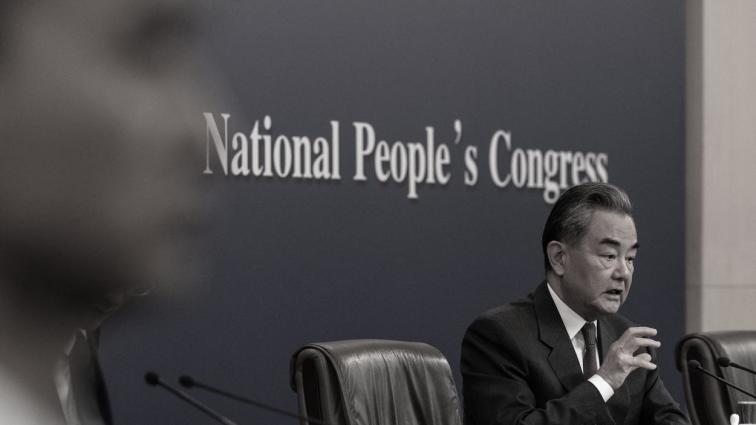U.S.-China Confrontation. (Video screenshot)
[People News] Various signs suggest that the Chinese Communist Party is keen to arrange a meeting between Trump and Xi Jinping. The BBC Chinese website cites scholars who analyse that while the Chinese leader may appear assertive, he is reluctant to sever ties with the United States due to two significant risks he faces: political and economic.
In recent days, interactions between China and the United States have increased.
On September 10, U.S. Secretary of State Marco Rubio spoke on the phone with Chinese Foreign Minister Wang Yi, with both sides describing the conversation as productive.
The day prior, on September 9, Chinese Defence Minister Dong Jun held a video call with U.S. Secretary of Defence Peter Hegseth.
On September 15, Chinese Vice Premier He Lifeng announced after discussions with U.S. Treasury Secretary Scott Bessent in Madrid, Spain, that both parties had agreed to a framework agreement regarding the TikTok issue. This is viewed as a significant breakthrough following several rounds of trade negotiations, during which the Chinese side had consistently rejected U.S. demands to sell the controlling stake of TikTok's Chinese parent company to American investors.
The Wall Street Journal reported on September 15 that over the past two months, Chinese diplomats have been actively advocating for Trump to visit China. The Trump administration considers the TikTok issue a litmus test; if China demonstrates flexibility regarding the sale of TikTok's control, it would signal that the Chinese side is willing to make necessary concessions to facilitate Trump's visit. Conversely, if China continues to delay, the U.S. may feel frustrated, potentially jeopardising Trump's trip to China.
Informed sources have indicated that Chinese Premier Li Qiang is expected to attend the United Nations General Assembly later this September, with hopes of meeting senior U.S. government officials to facilitate a visit by Trump to China. It is anticipated that Li will convey that if Trump visits China this year, Xi Jinping will be open to attending the G20 summit in the U.S. in 2026.
Dr Patricia Kim, a researcher at the Brookings Institution's China Centre, told the BBC, 'The increase in a series of working-level activities suggests that U.S.-China dialogue is warming up, and the likelihood of a summit between Trump and Xi is also increasing.'
Zhu Zhiqun, a professor of international relations at Bucknell University, also analysed for the BBC that 'the bilateral relationship is moving towards stability, clearly paving the way for the leaders' summit next month, and potentially for Trump's visit to China.'
The BBC noted that the Asia-Pacific Economic Cooperation (APEC) meeting in Gyeongju, South Korea, in October is viewed as a significant opportunity for the two leaders to meet, possibly through informal discussions.
The ASEAN leaders' summit in Malaysia later that month presents another opportunity for a meeting between the two.
Previously, Xi Jinping and other Chinese leaders had adopted a hardline stance towards the U.S.
Dr Kim pointed out, however, that they are not inclined to completely sever ties with the U.S., as this would pose serious economic and political risks.
Zhu Zhiqun also believes that China would be open to discussions and would welcome with 'grand displays and large orders.'
The Chinese economy's recovery momentum remains notably weak, influenced by the debt crisis, real estate crisis, and sluggish consumer spending. Economic data for August, released by the National Bureau of Statistics of China on September 15, indicates a slowdown in growth across multiple economic indicators. There has been no improvement in the housing market, unemployment rate, or deflation, which suggests signs of 'summer fatigue.' This situation heightens the urgency for the Chinese government to implement further economic stimulus measures.
Economists anticipate that, due to the impact of U.S. tariffs on global trade and the diminishing effects of companies' stockpiling inventory, China's economic growth rate for the remainder of this year is likely to decelerate compared to the first half.
Zhou Min, a senior economist at Mizuho Securities, told Liberty Times that 'we may witness a significant slowdown in GDP growth in the third quarter, and the high base in the fourth quarter suggests that economic growth may decelerate even more. Without major stimulus measures, the Chinese government's target of 5% growth may be hard to achieve.'
U.S.-based commentator Chen Pokong analysed in his self-media that the focus of this negotiation reveals Xi Jinping's intentions. 'Currently, the Chinese Communist Party is making numerous demands of the U.S., which are actually aimed at the Fourth Plenary Session, scheduled for late October.'
Recently, there has been rampant speculation regarding Xi Jinping's unstable grip on power, with suggestions that he may relinquish all or part of his authority during the Fourth Plenary Session.
Chen Pokong noted that while this negotiation appears to be about trade, Xi Jinping's true aim is to secure a visit from Trump to China. 'The reason he is pursuing this is that previous leaders of the Chinese Communist Party have relied on U.S. government recognition as a form of power endorsement to assert their authority within the party.'
According to informed sources speaking to the Wall Street Journal, "If Trump visits China, it will represent a major diplomatic victory for Xi Jinping."
In an article titled "Countdown to the Trump-Xi Summit," Dr Jin stated, "The U.S. can leverage this opportunity to achieve more sustainable outcomes, such as establishing economic safeguards, protecting America's core interests, and exerting pressure on Beijing in areas where collaboration is feasible." △











News magazine bootstrap themes!
I like this themes, fast loading and look profesional
Thank you Carlos!
You're welcome!
Please support me with give positive rating!
Yes Sure!